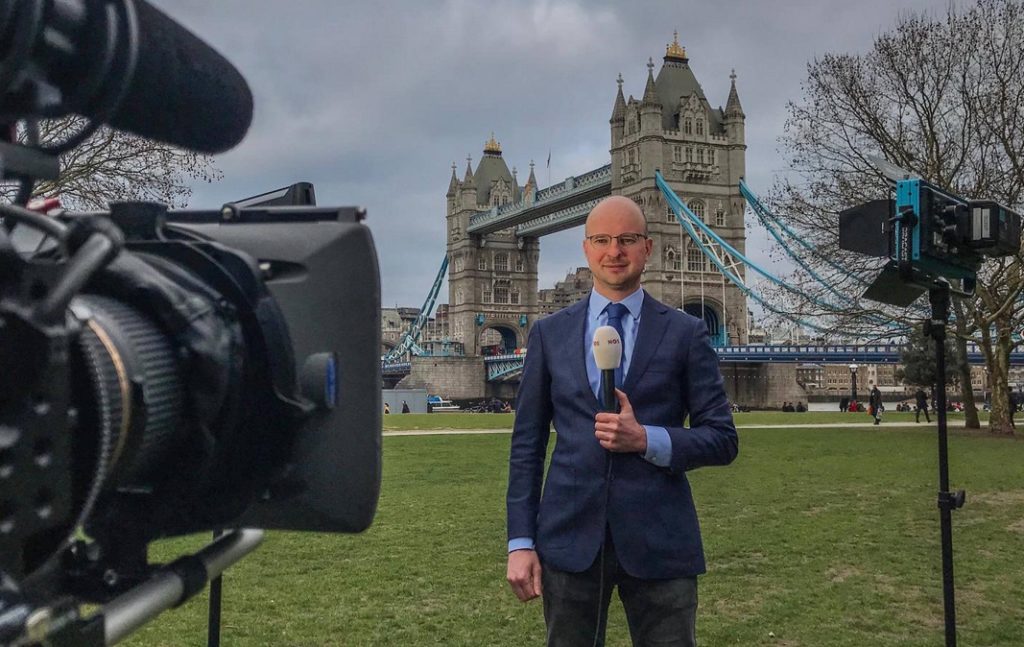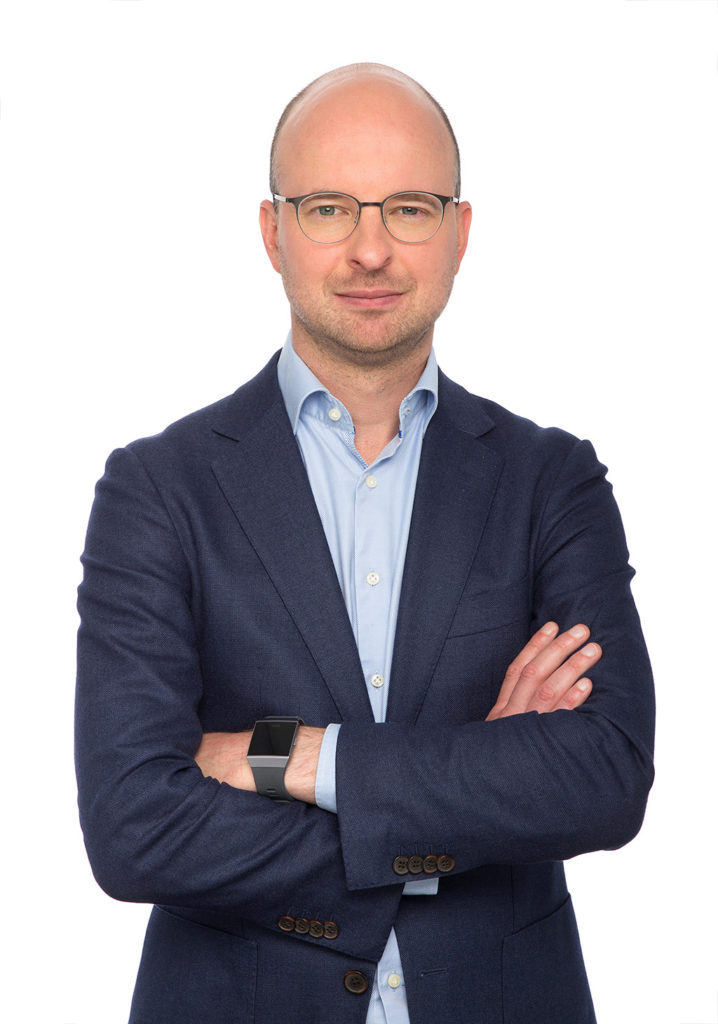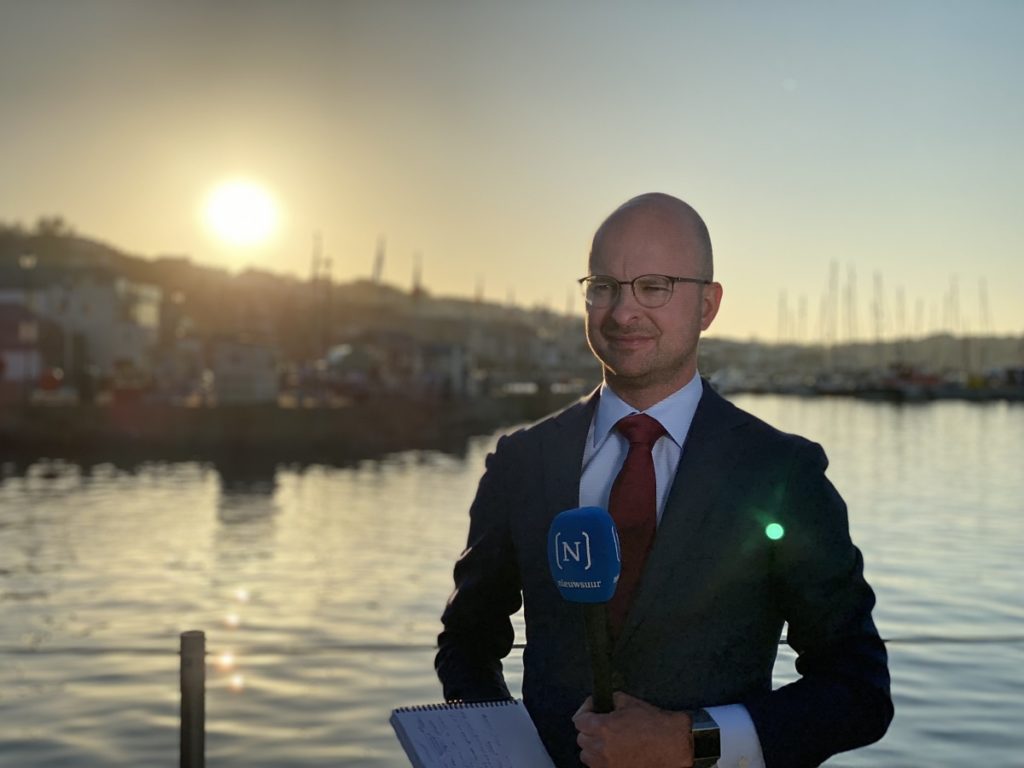Former NOS correspondent Tim de Wit on Brexit: ‘It has had more disadvantages than advantages’
Tim de Wit was an NOS correspondent in London for seven years, reporting daily on the chaos that ensued during Brexit. This year, his book Wankel Koninkrijk (Faltering Kingdom) was published. In this book, De Wit describes how he saw Britain change because of Brexit. “The United Kingdom is no longer a stable and peaceful democracy. There has been a huge political identity crisis there.”

Tim de Wit (1981) is still a busy man more than a year after his time as a correspondent. He presents the VPRO radio program Bureau Buitenland, makes the podcast Europa Draait Door with historian Arend Jan Boekestijn and is a welcome guest on talk shows in which he interprets news from Britain. Last month, at the invitation of Studium Generale, De Wit and Boekestijn were in Tilburg’s Schouwburg Concertzaal for an interactive theater version of their podcast. Univers spoke to De Wit before the program began.
For the British, 2022 was a bizarre year. They were presented with no less than three prime ministers, Johnson, Truss, and Sunak. Plus the death of Queen Elizabeth and the arrival of King Charles. Are you sorry you were no longer a correspondent?
“In terms of news developments, I left a year too early. But I don’t regret it, it was a well-considered decision to quit in July 2021. What I did have to get used to was suddenly sitting at home on the couch instead of reporting myself.
“As a correspondent, you do become attached to a country like that. You take in the news all day long. Because of Brexit, these were already intense news years. So when you think you’ve had it all, you get a year like 2022. In that respect, I felt sorry for my successor, Fleur Launspach. Because it’s not easy starting on three prime ministers and a deceased queen in the first year of your time as a correspondent.”
What did the above events do to the British?
“The death of the Queen has made the most impression. For many Britons, her death closed a collective part of history. I myself am not so much interested in the royal family. But as a correspondent in Britain, it still intrigued me because I saw what she did as a symbol for society. She was like everyone’s grandmother, someone who was always there.
“Elizabeth has been queen from 1952 to 2022. That means only people of 70 and older have ever experienced someone else on the throne. Besides, Charles is never going to reach the popularity of his mother; that man is already 74. The British will get a very different kind of king in return in that regard.
“Funnily enough, Liz Truss’ premiership has literally had the most impact. She made such a mess of things financially in 45 days, it really beggars description.”
In Wankel Koninkrijk you write: Brexit night was the most defining moment of my time as a correspondent. Why?
“Brexit night in 2016 was an ‘earthquake moment.’ We don’t have many moments like that. February 24, 2022, the Russian invasion of Ukraine, was also such a moment. In everything you feel: this is going to have gigantic consequences. I absolutely do not compare Brexit to a war, but when it comes to the consequences, I do.
‘I thought: my life from now on will be completely consumed by Brexit’
“In my book, I call Brexit the greatest European event since the fall of the Berlin Wall in 1989. Some people disagree, but I really see it that way. Because when, after all these years of expanding the European Union, a big country decides to get out, it’s really intense.
“During Brexit night, I had been a correspondent for a year and a half. I was reporting on the result of the referendum on the roof of a hotel. Then suddenly it turned out that the British had voted to leave the EU after all. Meanwhile, all I could think was my life is over because from now on it will be completely occupied by Brexit.”
The United Kingdom actually left the EU on Jan. 31, 2020. Again, what discontent was behind the desire to leave the EU?
“There were two main reasons why people voted for Brexit. The first was sovereignty. The British thought: we don’t like bureaucrats in Brussels deciding how we should run our country.

“The British are a proud and stubborn people, who saw the EU as a marriage of convenience with economic benefits. As the EU got bigger and took on more power, that started to rub off. What they didn’t realize is that the world no longer works in terms of sovereignty. You desperately need collaboration with other countries. The war in Ukraine shows that very clearly.
“The second issue was immigration. The EU has free movement of people. That means anyone can settle in Britain. Before Brexit, the British pound was very strong. So it was attractive to work there because you simply earned more. In particular, the less educated British noticed that they were getting competition from Poles, Hungarians, and Bulgarians, among others. The tendency was: they are taking our jobs and our government can’t do anything about it because, after all, we are members of the EU. This and that sovereignty were the breeding ground for Brexit.”
Would these arguments still resonate so much today?
“The sovereignty argument has less chance now that we are in wartime. The same applies to immigration because there is now a huge shortage in the labor market. You need those people very badly now. Interestingly enough, you see that Britain is actually letting in more migrants right now than before Brexit. The difference is that now they decide for themselves who they let in. I suspect many Dutch people would be in favor of that as well. It gives them a sense of being in charge of their own country.”
How has the United Kingdom changed after Brexit?
“There has been a huge political identity crisis. The United Kingdom is no longer a stable and peaceful democracy but a mess. How many political crises have we had in recent years? Before Brexit, the British had a tradition of parties and prime ministers who were in power for a long time. That is no longer the case. While the Conservative Party still rules, it has become hugely radicalized under Boris Johnson. From a moderate right-wing party, it has become a true Brexit party.
“Voters are getting lost as a result and don’t know where to go with their votes. Moreover, there is a government in power that, to this day, says Brexit was a great idea, rather than admitting that cracks do appear. That phase of denial is also very un-British.”
December 2022 could be called strike month in the United Kingdom. Almost every day, professionals strike because of inflation and cutbacks. Think of education, postal services, healthcare, and railroads. These occupational groups are also under pressure in the Netherlands. Do you see the same thing happening here?
“That discontentment prevails with us too. But the Netherlands is much more of a polder country. There is always a basis for unions and governments to negotiate. Especially when it comes to public sector jobs.
“In England, the gap between rich and poor is very large. Millions of citizens are currently unable to make ends meet. People in the private sector have received an average wage increase of almost 7 percent in recent years. In the public sector, that is, for bus drivers, train drivers, postal workers, and the like, the average wage increase was 2.7 percent. The latter group also took the hardest hit in the 2008 financial crisis and was barely compensated for it. What’s more, there have been significant cuts. This and Brexit are now coming together, causing enormous anger. The unions are saying, ‘Government, we’re going to make things very difficult for you.’ If everyone goes on strike at the same time, the country goes on lockdown. And that’s happening right now.
“The stories from healthcare, by the way, are harrowing. It takes an average of 18 weeks to see a doctor. People have to wait hours for an ambulance. Children die because they get care too late. For us, this is unimaginable; the Dutch would go crazy. The British are not actually a demonstrating people at all, they are rather calm. But this is just not sustainable anymore.”
The British tabloids played a fundamental role in Brexit, you say in your book. Do you see parallels between how certain groups of Britons disdain media like the BBC and how certain groups of Dutch people no longer trust the NOS, for example?
“We fortunately don’t have tabloids. Of course De Telegraaf likes to publish a populist opinion from time to time, but that is really different from The Daily Mail and The Sun. De Telegraaf doesn’t chafe against power as much as these tabloids do.
“Tabloids are the best-read newspapers and news sites in the country. They have a huge reach, and their influence is still very strong. Moreover, they have short lines to politics, especially the Conservative Party. The tabloids favored Brexit and played a big role in the Brexit vote by continuing to write negative stories about migrants. In addition, they kept highlighting everything they could blame Brussels for. This is less the case in the Netherlands. What you do see here is that some people have lost faith in the traditional media. That’s a problem because you don’t get that trust back just like that.”

What do you think the Dutch media can do about that?
“The only way is by continuing to practice very good journalism. So making sure that everything you relate is correct, making sure that you have done everything you can to check the facts and not corrupt with power. I hear more and more that the Dutch government and the NPO are hand in glove. That, of course, is complete nonsense.”
From what concrete examples can you tell that Brexit has not been a success?
“You can tell from the situation in Dover, for example. It’s not that it’s a daily mess with long traffic jams there, but if anything happens, it’s completely jammed. And that’s not even when all the controls are in place. These are always postponed because they also know that otherwise there will be more traffic jams.
“Also, Britain’s dependence on food imports is now very visible. Importing is becoming more expensive because of all kinds of additional trade barriers. I’ve spoken to a lot of entrepreneurs who are really suffering because of that. These things are eating away at the British economy.”
What benefits has Brexit had so far?
“The fact that the British can admit immigrants they can really benefit from is a big advantage, I think. Another plus is that they are no longer bound by EU rules. Of course, the EU is not all good. It is an incredibly unwieldy machine, for which many things could be more flexible. The bigger the EU gets, the harder to govern. If you look, for example, at the common agricultural policy and the nitrogen issue we have, the British are all no longer bound by that.
‘Since I returned to the Netherlands, I am shocked by the lack of decency’
“Pro-Brexit voters say, “You see, things are still going really great!” But I am very curious to see how the country develops in the next decade. Because of the coronavirus and the war in Ukraine, the effect of Brexit is currently less visible. Boris Johnson did a good job of hiding behind that. He simply said, “Recession? No, this is all because of the coronavirus and the war.
“Still, I think if you put the pros and cons side by side, in the end Brexit didn’t make things better.”
What can we in the Netherlands learn from the British?
“I lived abroad for a total of thirteen years. Since I returned to the Netherlands I am shocked by the lack of decency here. The Dutch are very often rude, boorish, unkind, and they think mainly of themselves. Of course, this does not apply to everyone and there are also differences between the Randstad and outside. But if a pregnant woman gets on the underground in London, six people get up. In that case, not everyone starts looking at their phones. People also get up here, but over there, it is much more normal to be considerate of each other in the public domain. Among the British, that politeness is learned. It is included in the upbringing, and at school, you learn to be polite to another person. In that respect, we have a lot to learn from the British.”
Translated by Language Center, Riet Bettonviel






